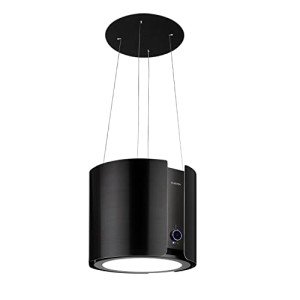10 Essentials About Island Extractor You Didn't Learn In School
ліёл¬ё

The Island Extractor Fan: Enhancing Kitchen Air Quality and Aesthetics
Intro
In modern home kitchen areas, the significance of ventilation can not be overstated. Cooking produces heat, smoke, and moisture, and inadequate ventilation can lead to unpleasant smells and an unhealthy environment. Enter the island extractor fan, a trendy and functional solution that not only enhances air quality however also elevates the kitchen's visual appeal. This post will explore the energy, types, installation considerations, and maintenance of island extractor fans, dealing with house owners and kitchen design enthusiasts alike.
What is an Island Extractor Fan?
An island extractor fan, likewise referred to as a kitchen island hood, is a kind of ventilation system usually set up above a kitchen island cooktop. These home appliances help to remove air-borne particles, grease, smoke, and smells that develop from cooking. Unlike standard wall-mounted hoods, island extractor fans are suspended from the ceiling, permitting for a more open kitchen layout.
The Benefits of Installing an Island Extractor Fan
Island extractor fan for island fans offer many benefits, making them a popular option in contemporary kitchens. Here are some essential advantages:
Effective Ventilation: Island exhaust hoods ensure that smoke and smells are quickly eliminated from the cooking area, promoting a healthier indoor environment.
Aesthetic Appeal: These fans been available in various designs, products, and finishes, permitting homeowners to pick a design that complements their kitchen decoration.
Versatile Installation: Installed anywhere above a kitchen island extractor hoods, these fans are highly flexible, accommodating numerous kitchen layouts.
Noise Reduction: Many contemporary island extractor fans are developed to run quietly, reducing disruptions throughout cooking.
Energy Efficiency: Energy-efficient designs can help lower energy consumption while preserving powerful air flow.
Table: Features of Island Extractor Fans
| Feature | Description |
|---|---|
| Kinds of Ventilation | Ducted (vents air outside) or ductless (filters air and recirculates) |
| Design Styles | Contemporary, conventional, or industrial |
| Materials | Stainless steel, glass, copper, and so on. |
| Size Options | Readily available in different sizes to fit different kitchen islands |
| Controls | Usually featured manual knobs, electronic touchpads, or remote control |
| Lighting | Integrated LED lights for boosted exposure while cooking |
Kinds Of Island Extractor Fans
When choosing an island extractor fan, it is important to be notified about the different types readily available:
Ducted island chimney hood Hoods: This type vents air externally, making it more effective at getting rid of smells and smoke. Nevertheless, it needs ductwork, which can be challenging in particular kitchen setups.
Ductless Island Hoods: These systems filter the air and recirculate it back into the kitchen. Although they are simpler to set up and do not require ducting, they may not remove odors as effectively as ducted alternatives.
Retractable Island Hoods: These models can be hidden when not in usage, providing a smooth and unobtrusive look. They extend when needed for ventilation.
Wall-Mounted Island Hoods: These are installed to the wall rather of being suspended from the ceiling however can provide an alternative option for cooking areas without ceiling access.
Installation Considerations
Setting up an island extractor fan needs careful planning. Here are some essential aspects to think about:
Height: The fan must be installed at a suitable height above the cooktop. Generally, the recommended distance is in between 28 to 36 inches, but this can differ based upon the model and regional building regulations.
Sufficient Ductwork: If opting for a ducted model, ensure that there is appropriate ductwork causing the exterior of the home.
Power Supply: kitchen island Hood Verify that the electrical supply is capable of supporting the fan's power requirements, and think about hiring a professional for electrical work.
Air flow Capacity: The fan ought to have adequate airflow capacity (measured in CFM - cubic feet per minute) for the size of the kitchen. A basic standard is 100 CFM for every 10,000 BTUs of the cooktop.
Aesthetic appeals: Consider the design and finish of the fan to ensure it harmonizes with the kitchen's total decoration.
Often Asked Questions (FAQs)
Q1: How do I clean and keep my island extractor fan?A1: Regularly clean the filters and outside surfaces with mild soap and water. Some filters can be washed in the dishwasher, while others need replacement. Check the maker's guidelines for specific care guidelines. Q2: Do I need expert installation for
an island extractor fan?A2: While some homeowners opt for DIY setup, hiring an expert is recommended, especially for ducted designs that need comprehensive electrical and ductwork factors to consider. Q3: How loud is an island extractor fan?A3: Noise levels can differ depending upon the design.
Many modern fans are developed to operate silently,
normally within the series of 40-70 decibels. Make certain to inspect the specifications for sound levels. Q4: Can I utilize an island extractor fan in a small kitchen?A4: Yes, there are numerous sizes readily available.
It's vital to choose a light-weight and compact model that fits your kitchen without overcrowding the area. Q5: Is a ductless island extractor fan effective?A5: While ductless fans are hassle-free and easy to install, they are normally less efficient than ducted models at eliminating smoke and odors. Nevertheless, they can still filter
grease and particulates and are an excellent option for smaller areas or homes. An island extractor fan is a necessary element of any modern-day kitchen, providing both performance and style. By thinking about the various types offered, setup requirements
, and upkeep practices, property owners can enhance their cooking experience and ensure a pleasant kitchen environment. As kitchen areas continue to be more than simply cooking areas-- working as collecting areas for families and pals-- purchasing a quality island extractor fan for island hob fan is a smart choice for both health and looks.

лҢ“кёҖлӘ©лЎқ0
лҢ“кёҖ нҸ¬мқёнҠё м•ҲлӮҙ